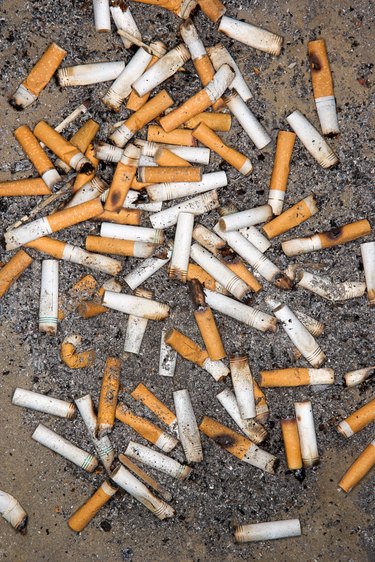 Cigarette ends are among the commonest types of litter. Image Credit: Jupiterimages/Photos.com/Getty Images
Cigarette ends are among the commonest types of litter. Image Credit: Jupiterimages/Photos.com/Getty Images
A smoker lights a cigarette, smokes it down and tosses away the stub. It’s a habit, an automatic sequence, and the smoker may think anything as small as a cigarette end surely cannot make much difference. Cigarette stubs, however, soon mount up: 4.5 trillion of them are thrown away each year throughout the world, according to the Ocean Conservancy. On that scale, they make a big difference to the street, the soil and the environment, as well as increasing fire risk.
Video of the Day
Toxic Ingredients
Tobacco contains heavy metals and other chemicals, which can poison creatures that eat discarded tobacco cigarette stubs. The toxic elements also leach into soil and water. The concentration of unwanted elements alters soil’s chemical balance and acidity, which affect the health of plants growing in the soil. The most harmful ingredients in cigarette ash include lead, nickel, titanium and zinc, which are released rapidly into soil and water in strong concentrations; the ingredients barium, strontium, manganese and iron wash out more gradually over weeks.
Slowly Degrading Waste
Many people assume that tobacco leaf and the paper in which it is rolled to create a cigarette are biodegradable and soon rot away. That assumption is only partly true. Metals leach from discarded ash at varying rates but then degrade very slowly and may remain for decades in soil, affecting the plants that grow there and animals that feed on them. Radioactivity from phosphates, which commonly are used to fertilize tobacco crops, may remain in soil for years. Cigarette filters, part of the stubs, are made from cellulose acetate, a plastic that can take as much as 12 years to decompose.
Cycle of Contamination
Tobacco plants absorb heavy metals such as zinc, cadmium and lead from soil and particularly from the fertilizers and pesticides used on tobacco plantations. These chemicals are stored in tobacco leaves and, therefore, become part of cigarettes. As well as directly damaging smokers’ health, the chemicals return to the soil as cigarette ash, where they contribute to pollution and eventually pass into the food chain through the grass or crops that grow on the site where the ash fell. They cause long-term harm by gradually building up in the bodies of the people and animals that consume these crops; for example, lead affects brain activity, and cadmium can affect the digestive processes.
The Wider Picture
On one hand, the tobacco industry brings employment to people in poor areas of the world and profit to the companies that employ them. The effect of cigarette ash on soil, however, is a small part of a wider picture of soil degradation and greenhouse gas emission. These long-term risks result in part from the clearing of forests to plant tobacco and the application of artificial fertilizers to make it grow.



























